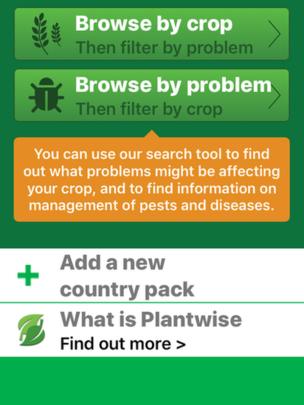UK researchers have developed an early warning system to prevent the crops of African farmers from being devastated.
The Pest Risk Information Service (Prise) combines temperature data and weather forecasts with computer models.
It then sends farmers a mobile phone alert so that they can take precautions.
It is hoped that the system will boost yields and increase farm incomes by up to 20%.
Prise is being used in Kenya, Ghana and Zambia and will be rolled out soon in other parts of the world.
Prise is an upgrade of a highly successful UK Aid scheme run by the Centre for Agriculture and Bioscience International development charity (CABI). It uses a network of so called "plant doctors" and clinics to advise farmers when pests or diseases destroy their crops.

The "doctors" draw on a database using an an app to help them to diagnose the issue and then prescribe the right pesticide and other measures. Walter Wafula, who grows Maize in Bungoma in Kenya, told BBC News that the service had transformed his family's lives.
"Because of the increased income from my farm, my kids can now go to a better school and the life at home has improved because I can provide the basic needs for my family," he said.
So far, the scheme has helped 18.3 million farmers, in 34 countries across Africa, Asia and the Americas. On average farm incomes and yields are 13% higher for those using the service.

The data for the Prise system will be processed by the JASMIN supercomputer data cluster in Oxfordshire
But Prof Charlotte Watts, chief scientific adviser for the UK's Department for International Development, which funds the plant doctor scheme, says a new initiative with CABI and the UK Space Agency (UKSA) will use the network to prevent, rather than just mitigate infestations.
She says the idea is to use satellite data collected by the UKSA to develop a system that is able to predict when pest infestations will strike a week or more in advance.
Satellites can provide accurate land temperature information, which is one of the most important drivers of pest infestations. This, combined with weather data and computer models, can be used to give farmers enough time to spray pesticide and take other precautions.
CABI worked with the UK's Science and Technology Facilities Council, to develop the project. Prof Watts told BBC News that the early indications are that the system is working.
"Farmers are completely dependent on crops and the predictability of having a good yield to survive and also to send their kids to school," she said.
"So if we can reduce the impact of pests, if we can enable them to get better yields - which we are already seeing - it will mean that we can help them move out of poverty."
Latest Stories
-
Saminu Abdul Rasheed smashes national record again with 9.84s sprint in Georgia
2 hours -
Blekusu Coastal project: We’re reclaiming our coastlines – Housing Minister
5 hours -
Pricey plantains push Ghana’s market sellers to diversify
5 hours -
Full list: NPP delegates approve 54 reform motions, reject proposals on youth age, election supervision
5 hours -
WAFCON 2024: Cynthia made it easy – Chantelle hails goalkeeper after penalty saves
5 hours -
Cyber Security Authority boss suspended over use of military bodyguard
6 hours -
WAFCON 2024: I want to make history – Grace Asantewaa dreams of lifting the trophy
6 hours -
Afenyo-Markin accuses NDC of rebranding and claiming credit for NPP projects
6 hours -
2024 WAFCON: Grace Asantewa shines as Black Queens reach semis
6 hours -
WAFCON 2024: Ghana beat Algeria 4-2 on penalties to book semi-final spot for the first time since 2016
6 hours -
NPP Delegates reject motion to shift polling station selection oversight to regional committees
6 hours -
2024 WAFCON: Black Queens set up semifinal clash with hosts Morocco
6 hours -
Dr. Amuasi champions healthy sustainable socio-ecological systems thinking in Lancet One Health Commission Report
6 hours -
Without unity, we’re just individuals with ambition – Afenyo-Markin
6 hours -
Rebecca Tweneboah Darko: Scattered thoughts; Scary times
6 hours

